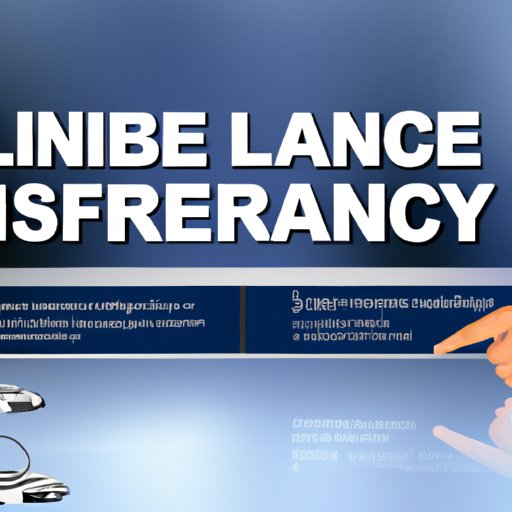Introduction
Financial lines insurance is a type of liability insurance that provides businesses with protection from financial losses due to legal action taken against them by third parties. Businesses can purchase these policies to cover potential losses caused by errors, omissions, and negligence on their part. Additionally, these policies can protect businesses from cyber-attacks, fraud, and other types of malicious activity. In this article, we will explore the basics of financial lines insurance, the types of policies available, the benefits they offer, the impact they have on businesses, the cost of these policies, and the risks of not having financial lines insurance.

Explaining the Basics of Financial Lines Insurance
Financial lines insurance is an umbrella term used to describe a variety of policies designed to protect businesses from financial losses due to third-party claims. These policies provide coverage for claims related to errors, omissions, or negligence on behalf of the business. The purpose of these policies is to minimize the financial burden on businesses in the event of a lawsuit.
There are several different types of financial lines insurance policies available. These policies vary in terms of the type of coverage they provide, the amount of coverage they offer, and the cost of the policy. Some of the most common types of financial lines insurance policies include professional liability insurance, errors and omissions insurance, directors and officers liability insurance, cyber liability insurance, and employment practices liability insurance.
Understanding the Types of Financial Lines Insurance
Professional liability insurance is a type of financial lines insurance that provides coverage for claims related to errors and omissions resulting from the performance of professional services. This type of insurance is commonly purchased by professionals such as doctors, lawyers, and accountants. It is also known as malpractice insurance.
Errors and omissions insurance is similar to professional liability insurance but is typically purchased by businesses that provide services or advice to clients. This type of insurance covers claims related to errors or omissions made by the business while providing services or advice. It is also known as E&O insurance.
Directors and officers liability insurance is a type of financial lines insurance that provides coverage for claims related to the actions taken by a company’s board of directors or officers. This type of insurance is often purchased by publicly traded companies to protect against claims of negligence or mismanagement. It is also known as D&O insurance.
Cyber liability insurance is a type of financial lines insurance that provides coverage for claims related to cyber-attacks or data breaches. This type of insurance is commonly purchased by businesses that store sensitive customer information or engage in online commerce. It is also known as cyber risk insurance.
Employment practices liability insurance is a type of financial lines insurance that provides coverage for claims related to workplace discrimination or wrongful termination. This type of insurance is often purchased by companies that have employees or contractors. It is also known as EPLI insurance.

Examining the Benefits of Financial Lines Insurance
Financial lines insurance provides businesses with several benefits. The most important benefit is the protection it offers from third-party claims. In the event that a business is sued, these policies can help to reduce the financial burden of the lawsuit. Additionally, these policies can provide cost savings since they can help to avoid expensive litigation fees.
Another benefit of financial lines insurance is the peace of mind it provides. Having this type of insurance can give businesses the assurance that they are protected in the event of a lawsuit. This can help to reduce stress and allow businesses to focus on running their operations rather than worrying about potential legal issues.

Highlighting the Impact of Financial Lines Insurance on Businesses
Financial lines insurance can have a positive impact on businesses. One of the most significant impacts is increased profitability. Having this type of insurance can help to reduce the financial burden associated with lawsuits, allowing businesses to reinvest those savings into their operations. This can lead to increased profits over time.
Having financial lines insurance can also improve a business’s reputation. Customers and potential investors will view a business more favorably if they know that the business is covered in the event of a lawsuit. This can help to attract new customers and increase investor confidence.
Finally, financial lines insurance can enhance a business’s risk management efforts. Having this type of insurance can help to reduce the likelihood of a lawsuit, as well as the financial burden should one occur. This can help businesses to identify and mitigate potential risks before they become major problems.
Analyzing the Cost of Financial Lines Insurance
The cost of financial lines insurance depends on several factors, including the type of policy, the amount of coverage, and the specific risks associated with the business. Generally speaking, these policies tend to be relatively inexpensive when compared to other forms of insurance. However, it is important to shop around and compare rates from multiple providers in order to get the best deal.
In addition to the cost of the policy itself, businesses should also factor in the cost of any additional coverage they may need. For instance, some policies may require additional coverage for cyber-attacks or data breaches. Businesses should make sure to consider all of these costs when shopping for financial lines insurance.
Assessing the Risks of Not Having Financial Lines Insurance
Not having financial lines insurance can expose businesses to several risks. The most obvious risk is potential financial loss. If a business is sued and does not have the necessary insurance coverage, they could be liable for the full amount of the claim. This could lead to significant financial losses, which could put the business at risk of bankruptcy.
Not having financial lines insurance can also lead to a loss of credibility. Customers and investors may view a business more skeptically if they know that the business is not adequately protected from potential lawsuits. This could lead to a decrease in customer loyalty and a decrease in investor confidence.
Finally, not having financial lines insurance could lead to legal consequences. Depending on the circumstances, a business that is found to be negligent or reckless could face criminal charges. This could result in hefty fines and even jail time for company executives.
Conclusion
Financial lines insurance offers businesses protection from third-party claims, cost savings, and peace of mind. It can also have a positive impact on businesses in terms of increased profitability, improved reputation, and enhanced risk management. While the cost of these policies varies depending on the type of coverage and the specific risks associated with the business, the cost is usually relatively low when compared to other forms of insurance. Finally, not having financial lines insurance can expose businesses to potential financial losses, a loss of credibility, and even legal consequences.
(Note: Is this article not meeting your expectations? Do you have knowledge or insights to share? Unlock new opportunities and expand your reach by joining our authors team. Click Registration to join us and share your expertise with our readers.)
